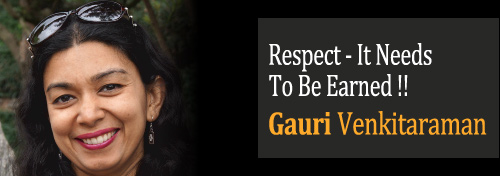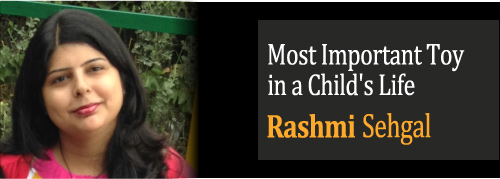Respect – It Needs To Be Earned !!
The other day, as I was heading back home from work, I was indeed looking for a semblance of peace on the bus. What I encountered instead, was a war of words between a mother and daughter. The mom was in an absolutely furious state of mind and both the ladies were flashing daggers at each other. I dug around in my bag for my earphones because something told me that what was happening right then was just the lull before the storm. As always, Mr.Murphy proved triumphant once again as I realized that I’d left my earphones behind at school.
Of the whole fight that ensued, two statements registered loud and clear in my mind. One was the mom saying “Can’t you respect my feelings ? I am your mother – don’t ever forget that. You’re supposed to do as I say, you are supposed to respect what I say.” The other was her daughter saying “How can you expect me to respect you when you don’t have even a little bit of idea as to how I feel most of the time. How I am feeling now when you are screaming at me in front of all these people. You don’t respect my feelings even a little bit?”
I certainly am not going to pass any value judgements on the above scene but the young girl’s words did keep resonating inside my head.
During my growing up years parental command was a way of life and was unquestioningly accepted and followed. There was absolutely no questioning the chain of command, however, as that was always regarded as open mutiny and was dealt with very strictly. Arguments or voices of dissent were a long long way off. They were unimaginable. What my parents wanted me to do, I had to do. Period. No questions asked!!!
Which brings me to my present question?
As parents, is it not necessary for us to earn our kids’ respect? Or is it something that is taken for granted?
During my growing up years, it was pretty much taken for granted and there was no specific concept of “earning your childs’ respect”. Just by virtue of being their children’s’ parents or elders of the family, it was assumed that being respected was one of their many perquisites.
I personally choose to disagree with this assumption.
Respect from another person is something that one earns – through one’s actions, through one’s character, through one’s opinions, through the way one handles oneself and most importantly, by respecting the individuality of the other person. Each person is unique, each personality distinct. That element of individualism that makes a person who he or she is, has to be respected and I personally believe that this is the case even with our children. Parents cannot expect children to look up to them just by virtue of being their biological parents.
I’ve said this before too and I’m saying it again. Conceiving a baby, carrying the baby around for nine months and giving birth to the baby does not complete the picture of parenthood. This is just the beginning. Parenthood is more like a journey – one which never really ends. It is a journey where one moves from one phase onto another and another. It is a journey which has its highs and lows, its thrills and trials, its joys, its fair share of trials and tribulations. Therefore, claiming the mantle of being a child’s biological parents does not give parents the right to stipulate or exact a child’s respect.
It has to come from the child – naturally.
Why is this concept so difficult to stomach?
Why should one just assume that there is no need to “give” a child respect because he or she is chronologically younger than the parent?
There was this incident that happened a few years back.
Macadamia used to attend BalVihar classes conducted by the Chinmaya Mission in Hong Kong. In their curriculum that particular year, they were doing the alphabets A to Z – as in teaching children good qualities that start with the letter A and teaching them to avoid bad ideas that start with the same alphabet and so on and so forth. It was a stellar concept and a rather interesting way of getting the message across to the children.
When they reached the alphabet M, the Chinmaya Mission had drawn up plans to conduct “Matru Puja” on a worldwide basis. The basic idea being that children would worship their mothers, as the term “Matru Puja” indicates. It was going to be a very short affair. The mothers would be sitting right in front of their children and I believe the children would be sprinkling some water on their mothers feet, putting kumkum on their mothers feet and then doing aarti for their mothers.
I spent a lot of time introspecting on the issue because I was not at all comfortable with the idea. It was not a feeling of embarrassment but rather a question, a reservation about the necessity and validity of this whole venture. After talking this over with Vic, both of us were of the same opinion – we did not want to be part of this. We spoke to Aparna about the whole thing and explained our point of view to her. We wanted to make sure that we were not putting her in a spot with airing our views and acting upon them. Eventually I spoke to Aparna’s BalVihar teacher about my misgivings and requested to be excluded from the proceedings.
Later, there were phone calls from the Head of the Chinmaya Ashram, asking me to reconsider my perspective and my attitude towards the whole Matru Puja program.
“Would you not touch an elder’s feet as a sign of respect ?” she asked.
“I would” was what I said. “Because that is what I’ve been trained to do. And even if my heart were not in it, I still would touch their feet just to avoid hurting anybody’s feelings.” I also remember saying to her then “At this point in my life, respect is something I would consider complete and pure when the physical act of touching a person’s feet or falling at a person’s feet is accompanied by an equally strong feeling of respect stemming from within my heart. I would not choose to disassociate the two. Just touching a person’s feet, in my opinion, does not construe respect. It could be “seen” as a mark of respect but is it reverence in its true form if it is not supplemented by a strong sentiment within the heart of hearts.”
Even in the case of our children – we do not wish to have them worship us nor do they have to physically touch our feet or do a ‘puja‘ for us in order for them to show that they respect us. Just because one touches another person’s feet does not necessarily mean that they respect them and vice versa.
What is more important is establishing that rapport which makes it possible for our children to approach us, as their parents, freely and without fear, be it to ask for our opinions on a particular issue or ask for our counsel. Also, in each and every action of ours, as parents, it is indeed imperative that we bear in mind that they are individuals in their own right.
When children are little, there are a lot of decisions that we, as parents, take, on their behalf. But that feeling of respecting them and their feelings manifests itself when we give them choices. It gives them a sense, an element of control on a particular situation and this sense of control is so very important in the development of their self-confidence and individual self-identity.
There will indeed be many occasions when a parent has to say No to the child. But this too can be accomplished in a more even manner. Isn’t it better if an answer in the negative is accompanied with a logical explanation as to why the request was turned down – rather than to just say “You cannot get that or you cannot do that. I’m telling you that and that’s it. You better do as I say or else …”
As parents, we do tell them how to handle situations or what to do or how to go about it to the best of our knowledge but if and when children choose to put forth questions about how we arrived at a particular conclusion or even if we do have to explain our actions, I would say it is better to take that approach rather than be forceful about the whole thing.
Children and parents may not always see eye to eye on many issues but that just expands the equation rather than curb it. Indeed there may well be situations where children see different shades to a particular issue that we, as adults in all our infinite wisdom, might well have missed out on. All that is needed is to listen to them when they air their views or opinions or requests rather than a blunt “I know better than you so you listen to what I say and not the other way around.”
Instead of forcing kids to see things our way just by virtue of being their parents, is not a dialogue an infinitely better option? Through this constant interaction, exchange of opinions and from the fact that their viewpoints too are being appreciated, there develops a feeling of mutual respect and warmth – values that were hitherto taken for granted.
When it is a done thing in society to say that respect given is respect earned, when one talks about the mannerisms and behaviour of adults towards adults, why not extend this courtesy to children too? Why then, should parenthood be synonymous with dictatorship ? Why does parental autocracy need to rule when there is room for consent, compromise and harmony to thrive ?
Like I said in one of my earlier posts, a parent’s responsibility does not end by bringing a child into this world. On the contrary, that is when it begins. In bringing a child into this world, nature hands parents the job of sculpting another life – physically, mentally and emotionally. It is indeed a huge responsibility.
I remember coming across a Chinese proverb which goes
“Respect for ones parents is the highest duty of civil life.”
Would it not be so much better if respect were given willingly and meaningfully from the heart rather than just out of a sense of duty?
And I found the answer to this question in an anonymous quote which resonates how I feel about this value and it goes
“Respect cannot be learned, purchased or acquired – it can only be earned.”
Gauri Venkitaraman dons many hats – a wife, a mom, a teacher and many more. Working as a full-time English teacher in HongKong, Gauri also raises and nurtures two terrors, affectionately known as The Nutty Siblings a.k.a Macadamia, a teen and Pecan, the ten-year old who behaves like he is fifteen. Gauri’s family means the world to her. Life is a lively roller coaster ride and we, as a family, aim to enjoy the ride together. http://tiny-tidbits.blogspot.hk/ is where Gauri pens down her thoughts and musings, in an attempt to preserve memories for posterity


